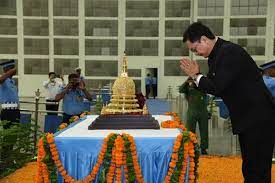- From February 22 to March 18, India will display several Lord Buddha relics in Thailand that are now in its possession.
Kapilvastu Relics: Details
- The relics of Lord Buddha and his followers Arahata Sariputra and Arahata Maudgalayana are known as the ‘Kapilvastu Relics.’
- Origin: These artefacts, which include 20 bone fragments, have been conserved at India’s National Museum.
- They were discovered in 1898 at a site in Bihar thought to be the ancient city of Kapilvastu. An inscribed casket discovered at the stupa site in Piprahwa (near Siddharthnagar in Uttar Pradesh) helped identify Kapilavastu.
- These artefacts, discovered in Bihar’s Piprahwa, are thought to be from the ancient city of Kapilvastu and date back to the 4th or 5th century BC.
- Excavation Details: The ASI discovered these relics during excavations from 1971 to 1977, including two inscribed steatite stone caskets containing 12 and ten religious relics, respectively.
Public Display in Thailand
- Previous Exhibitions: Portions of these relics were previously shown in Sri Lanka (1976, 2012), Mongolia (1993, 2022), Singapore (1994, 2007), South Korea (1995), and Thailand (1995).
- The Thai government has constructed a special pagoda in Bangkok to house the artefacts during the display.
Significance of Display: Promoting Indian Diplomacy
- Diplomatic Achievement: This event is a diplomatic achievement for India by building connections with Thailand and encouraging cultural interchange.
- Buddhist Circuit Development: The effort is consistent with India’s ‘Look East’ policy, emphasising the promotion of soft power through cultural exchange.
- Previous Engagements: India transferred the relics to Mongolia in 2022 and Sri Lanka in 2012, demonstrating its commitment to strengthening cultural and spiritual connections.
Source: https://indianexpress.com/article/india/buddhas-relics-at-national-museum-to-be-on-display-in-thailand-9172154/#:~:text=The%20relics%20at%20the%20National,Pradesh)%20that%20helped%20identify%20Kapilavastu.

